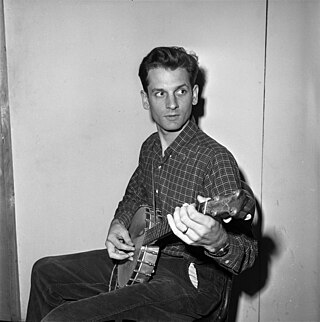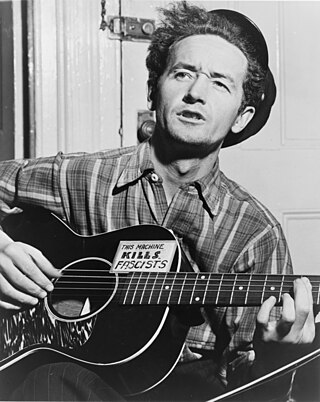Related Research Articles

The New Lost City Ramblers, or NLCR, was an American contemporary old-time string band that formed in New York City in 1958 during the folk revival. Mike Seeger, John Cohen and Tom Paley were its founding members. Tracy Schwarz replaced Paley, who left the group in 1962. Seeger died of cancer in 2009, Paley died in 2017, and Cohen died in 2019. NLCR participated in the old-time music revival, and directly influenced many later musicians.

Leonid Borisovich Kogan was a preeminent Soviet violinist during the 20th century. Many consider him to be among the greatest violinists of the 20th century. In particular, he is considered to have been one of the greatest representatives of the Soviet School of violin playing.
Edward Potts McCurdy was an American folk singer and songwriter. His most well-known song was the anti-war "Last Night I Had the Strangest Dream", written in 1950.

Ramblin' Jack Elliott is an American folk singer and songwriter and musician.

Mike Seeger was an American folk musician and folklorist. He was a distinctive singer and an accomplished musician who played autoharp, banjo, fiddle, dulcimer, guitar, mouth harp, mandolin, dobro, jaw harp, and pan pipes. Seeger, a half-brother of Pete Seeger, produced more than 30 documentary recordings, and performed in more than 40 other recordings. He desired to make known the caretakers of culture that inspired and taught him.
Bill Leader is an English recording engineer and record producer. He is particularly associated with the British folk music revival of the 1960s and 1970s, producing records by Paddy Tunney, Davey Graham, Bert Jansch, John Renbourn, Frank Harte and many others.

The Piano Trio No. 2 in E minor, Op. 67, is a piece for violin, cello and piano by the Russian composer Dmitri Shostakovich, started in late 1943 and completed in August the following year. It was premiered on 14 November 1944. The piece was dedicated to his close friend Ivan Sollertinsky, whose death in February 1944 affected Shostakovich profoundly.
Jacques Leiser is an international artists manager and photographer who has represented and collaborated with many of the world's greatest concert pianists, composers, violinists and singers.
Smithsonian Folkways is the nonprofit record label of the Smithsonian Institution. It is a part of the Smithsonian's Smithsonian Center for Folklife and Cultural Heritage, located at Capital Gallery in downtown Washington, D.C. The label was founded in 1987 after the family of Moses Asch, founder of Folkways Records, donated the entire Folkways Records label to the Smithsonian. The donation was made on the condition that the Institution continue Asch's policy that each of the more than 2,000 albums of Folkways Records remain in print forever, regardless of sales. Since then, the label has expanded on Asch's vision of documenting the sounds of the world, adding six other record labels to the collection, as well as releasing over 300 new recordings. Some well-known artists have contributed to the Smithsonian Folkways collection, including Pete Seeger, Ella Jenkins, Woody Guthrie, and Lead Belly. Famous songs include "This Land Is Your Land", "Goodnight, Irene", and "Midnight Special". Due to the unique nature of its recordings, which include an extensive collection of traditional American music, children's music, and international music, Smithsonian Folkways has become an important collection to the musical community, especially to ethnomusicologists, who utilize the recordings of "people's music" from all over the world.

The American folk music revival began during the 1940s and peaked in popularity in the mid-1960s. Its roots went earlier, and performers like Josh White, Burl Ives, Woody Guthrie, Lead Belly, Big Bill Broonzy, Richard Dyer-Bennet, Oscar Brand, Jean Ritchie, John Jacob Niles, Susan Reed, Paul Robeson, Bessie Smith, Ma Rainey and Cisco Houston had enjoyed a limited general popularity in the 1930s and 1940s. The revival brought forward styles of American folk music that had in earlier times contributed to the development of country and western, blues, jazz, and rock and roll music.
Stephen Wade is an American folk musician, writer, and researcher.
"San Francisco Bay Blues" is an American folk song and is generally considered to be the most famous composition by Jesse Fuller. Fuller first recorded the song in 1954, which was released by the World Song label in 1955. A "one-man band" rendition of the song featuring a kazoo solo was recorded by Fuller during a 1962 concert. It appears on a Smithsonian Folkways compilation, Friends of Old Time Music.

Frank Hamilton is an American folk musician, collector of folk songs, and educator. He co-founded the Old Town School of Folk Music in Chicago, Illinois in 1957. As a performer, he has recorded for several labels, including Folkways Records. He was a member of the folk group The Weavers in the early 1960s, and appeared at the first Newport Folk Festival in 1959. He was the house musician – playing guitar and other folk instruments – for Chicago's Gate of Horn, the nation's first folk music nightclub. After many years of teaching, playing, and singing in California he married a third time, and with his wife relocated to Atlanta, where he performs on banjo, guitar, ukulele, voice, and other instruments and co-founded the Frank Hamilton School in 2015.
Julian (Yulian) Grigoryevich Sitkovetsky was a Soviet violinist.

Ramblin' Jack Elliott Sings Songs by Woody Guthrie and Jimmie Rodgers is an album by American folk musician Ramblin' Jack Elliott. It was released in 1960 in Great Britain and in 1962 in the US on the Monitor label.
Folkways Records was a record label founded by Moses Asch that documented folk, world, and children's music. It was acquired by the Smithsonian Institution in 1987 and is now part of Smithsonian Folkways.

Moses Asch was an American recording engineer and record executive. He founded Asch Records, which then changed its name to Folkways Records when the label transitioned from 78 RPM recordings to LP records. Asch ran the Folkways label from 1948 until his death in 1986. Folkways was very influential in bringing folk music into the American cultural mainstream. Some of America's greatest folk songs were originally recorded for Asch, including "This Land Is Your Land" by Woody Guthrie and "Goodnight Irene" by Lead Belly. Asch sold many commercial recordings to Verve Records; after his death, Asch's archive of ethnic recordings was acquired by the Smithsonian Institution, and released as Smithsonian Folkways Records.

Rudolf Borisovich Barshai was a Soviet and Russian conductor and violist.

The Moscow Chamber Orchestra (MCO) is a chamber orchestra run under the auspices of the Moscow Philharmonia, a state-run enterprise, formerly under the patronage of the Ministry of Culture and now, Ministry of Culture of Russian Federation.
Stinson Records was an American record label formed by Herbert Harris and Irving Prosky in 1939, initially to market, in the US, recordings made in the Soviet Union. Between the 1940s and 1960s, it mainly issued recordings of American folk and blues musicians, including Woody Guthrie and Josh White.
References
- 1 2 3 Reineke, Hank (2009). Ramblin' Jack Elliott: The Never-Ending Highway. Scarecrow Press. p. 147. ISBN 9780810872578.
- 1 2 3 4 5 "Monitor Waxes 1st 3 Albums". Billboard. December 15, 1956. p. 30.
- ↑ "Disk Execs Project Different Points of View on Three Fronts". Billboard. October 15, 1966. p. 48.
- ↑ "RIAA Elects Lieberson". Billboard. February 1, 1964. p. 5.
- ↑ "Monitor to Promote U.S. Artists Series". Billboard. November 4, 1957. p. 20.
- ↑ "Marek Calls Club Boon To Whole Disk Industry". Billboard. February 16, 1963. p. 4.
- ↑ "Musictapes Deal". Billboard. March 2, 1963. p. 8.
- ↑ "Transglobal in Deal - Including The Scandinavian". Billboard. February 2, 1963. p. 6.
- 1 2 3 4 5 6 7 8 9 10 11 12 "Monitor Bows Budget Line; to Retail at $1.98". Billboard. April 16, 1966. p. 44.
- ↑ "Gift Records That Sell Cheap... Yet Still Sound Great". The Kiplinger Magazine. December 1966. p. 16.
- 1 2 3 "Monitor Disk - 1st Pressing of Mysliveecek". Billboard. September 16, 1967. p. 54.
- ↑ "Monitor Adds Pop Records". Billboard. May 11, 1968. p. 4.
- 1 2 3 Bessman, Jim (June 19, 1999). "Smithsonian Folkways Gains Two Imprints". Billboard. p. 55.
- ↑ Young, Izzy (2013). Barretta, Scott (ed.). The Conscience of the Folk Revival: The Writings of Israel "Izzy" Young. Rowman & Littlefield. p. 22. ISBN 9780810883086.
- ↑ Shay, Anthony (2008). Dancing Across Borders: The American Fascination with Exotic Dance Forms. McFarland. p. 24. ISBN 9780786437849.